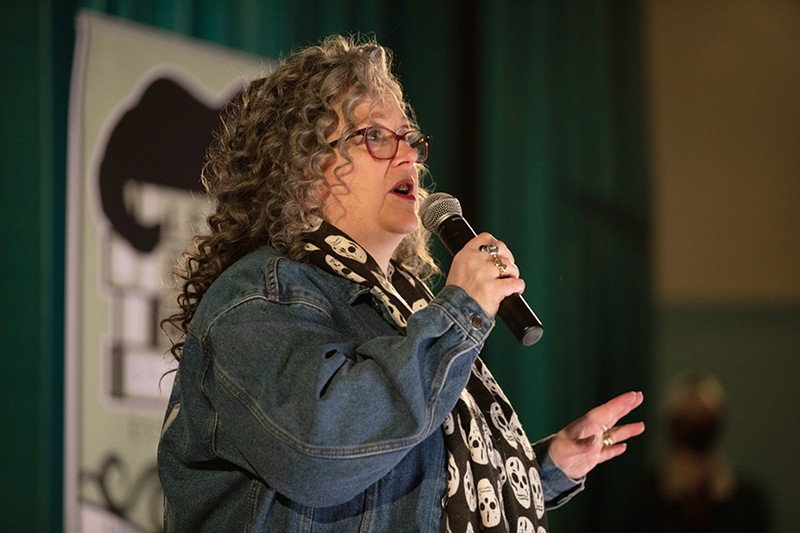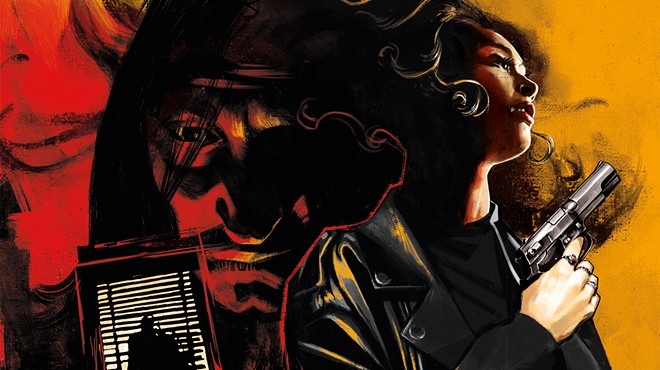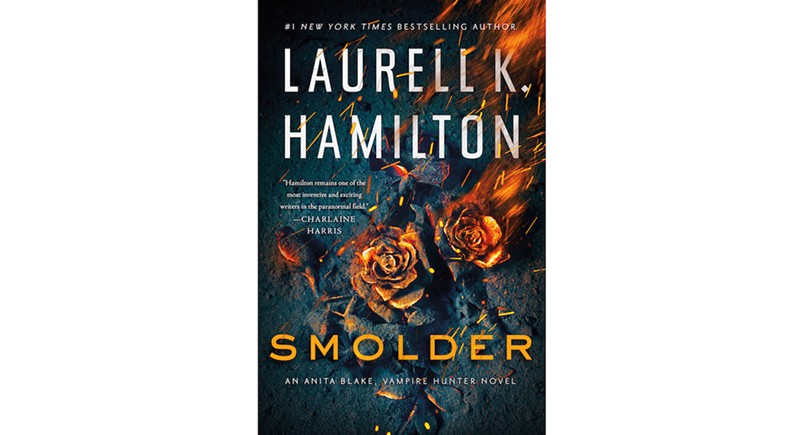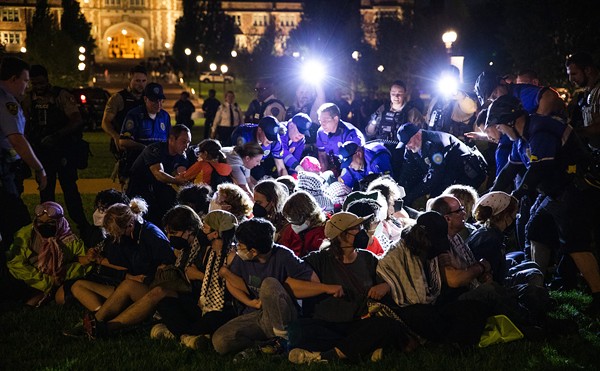
Anita Blake is a badass bitch. The St. Louisan is not only a vampire hunter turned U.S. Marshall who hunts down and executes supernatural creatures on the wrong side of the law, but she's one of the most powerful necromancers in the world. If that wasn't enough for a modern gal, Blake is one third of a vampire triumvirate that boosts the powers of all involved. She has a lot of hot sex — with the triumvirate, vampires and wereanimals — while solving mysteries and generally saving the day.
This year, she turns 30. Or rather, her books do. Blake is the titular character in St. Louis-based writer Laurell K. Hamilton's Anita Blake, Vampire Hunter series. Hamilton is a pioneer in books that blend genres (mystery, fantasy, romance, erotica) and opened the door for many to follow in her footsteps. A New York Times bestselling author of three separate series, Hamilton was born in "the middle of nowhere" Arkansas and moved to an area near Kokomo, Indiana, as a toddler. Inspired by a drugstore dime novel — Pigeons From Hell by Robert Howard — she started writing as a preteen.
She hasn't stopped since. As the Anita Blake series hits three decades, I connected with Hamilton over the phone to discuss book 29, Smolder, which published in late March; setting her books in St. Louis; keeping the sex interesting; and more. Head here for an excerpt of Smolder.
This interview has been edited for clarity and length.
Congrats on the new book. How does it feel to have been publishing Anita Blake since 1993?
It's always amazing because when I first started out, I'd had an earlier series that was going to be four books. But the first book, Night Seer, did not sell well enough, like most first novels don't, and they did not want the second book. When I got the first Anita Blake contract, it was for three books. I remember going, "There'll be at least three books in the series." I had no idea that it would continue to be popular enough and do well enough that I would get the opportunity to publish the 29th book.
I love what I do. I've wanted to do this since I was 14. To be able to have a dream since 14 and not only succeed in that dream, but to still be doing it and still be loving what I do, it just doesn't get better than that.
Were there any moments, since 14, where you've had doubts?
Yeah, college. I was in the writing program as a major; I wanted to get a creative writing degree. I entered the writing program with two stories. One was a vampire story, and one was a pastiche of H.P. Lovecraft. But they let me in the program, so I thought they were OK with me writing horror and stuff.
But two years in, the head of the writing program took me into her office. For between two and four hours — I no longer know — she did everything she could to destroy me as a writer. She told me I was no good. She told me I'd never publish. She sliced and diced me and served me on toast. She did everything she could to destroy me and make sure I'd never write again. Why did she do that? Well, it's because she let me come into the program writing genre, but she thought she could cure me.
I would not write again, after she did that to me, for over two years. Since I was 12, especially from 14 on, I've written every day, multiple times a day, at least some kind of note. But I would not pick up a pen to do that for two years. I didn't know if I'd ever write again.
How did you pick up a pen again?
Because I'm a writer. That's what I am. It's like breathing. I will write till I die.
What happened, though, is I ended up marrying my college sweetheart, and we moved to California for his job. There was a [writing] contest. I believe every six weeks, I had to have a story to put in. It wasn't that I thought I would win ... so much as I thought it was a deadline. That gave me something to shoot for. It gave me a timeframe. I got back into the habit of writing and telling stories again. I'd had an idea, actually that I'd had since high school, but I'd been too scared to try to write a book. I finally decided, "What do I have to lose?" I would get up at four or five in the morning before work and spend two hours in front of the computer, and I would write two to four pages. I wouldn't edit as I go, just stack it up beside the computer and then go to work. That is how I wrote most of my first novel.
How did you decide to place the Anita Blake stories in St. Louis?
I'm one of those writers that always does a better job if I have walked those streets. If I have been to a place, seen it, touched it. The first book especially, you can literally drive around and find everything. It's changed since then because one of the houses I use in the first book, Guilty Pleasures, people were knocking on their door looking for the characters.
I enjoyed Anita trying to figure out how to conceal her gun in the St. Louis humidity.
The first year to two I lived in St. Louis, every summer was 100-degrees-plus. I mean, it was after coming from California and then northern Indiana. St. Louis was a bit of a shock that first summer, and so there's so much heat imagery.
Do any of your favorite St. Louis places get nods in the books?
I love the Fox Theater. I've loved it since the first time I walked in. It's just so gorgeous and so much fun. I make sure that [characters] go there, have a good time and leave. We never trash the Fox, but I've had it [as a setting] at least twice and maybe more. When I lived in St. Charles, I would include the Missouri [River]. It's so pretty in the summer and shallow enough that you don't feel you're going to capsize and injure yourself. The Mississippi is shallow, too, so I'm told, but it's just so big. I'm not going to put an inner tube on the Mississippi.
When the series starts, Anita is more traditional, almost prudish. How did that change?
A fan came up to me at a signing and said, "I'm so glad you're doing the horror movie trope." I said, "I don't know which trope you're talking about." And he said, "I'm so glad you're doing the thing where the virgin survives, and the bad girl dies, like a slasher flick." I think that's sexist, and I think that's horrible. I didn't tell him all this, but I just said, "No, that's not my intent."
That planted the idea. If one person says that, what I've learned is, there are other people thinking it, too. I thought that's a horrible thing to say. Or a horrible trope. I hate that trope. This idea that if you're pure and virginal you survive, and if you have sex even once, then you're marked for death. That is such a negative message for women. I thought, OK, the books have been leading toward it. We're going to pick one of the guys that we've been going back and forth with for several books.
When I tried to write the scene in book six, where we finally break that barrier, I was so uncomfortable with it. I thought, "What does it say about me as a person and as a writer that I've written graphic, graphic death scenes, I mean, murder scenes, horrific murder scenes. I don't do gratuitous violence. But the violence that was necessary, I did it. And what does it say about me that writing sex between two people who care about each other, and who've known each other for five books before this, is more uncomfortable?" I didn't like what it said about me.
How does one write a good sex scene?
One of those things to me about the sex scenes is that if you're doing it right, they tell about character. You can tell something about somebody in an intimate scene like that, which doesn't come out any other way. I pride myself on trying to make each person have their own style in the bedroom, their own attitudes and interactions because it's one of the most personal things we do. And because, especially in this country, we don't talk about it. I don't think we understand that it is personal. It's special, and it should be special.
I am still getting women — all age groups — saying that before they read my books, they didn't know sex could be fun for women. There's something wrong that women still think that they're not allowed to have fun in the bedroom. It should be a pleasure. It's a gift. This is a soapbox for me, so I'll stop.
Were those responses how you got over your discomfort?
Yeah, it did encourage me to go: This is supposed to be mutually pleasurable. We're supposed to enjoy ourselves, everyone participating in a consensual relationship is supposed to enjoy themselves. That's the point. I was one of the first people that talked about birth control because once I realized that people were using it in a more serious manner than I had anticipated, I made sure that I talked about safety. I made sure I talked about certain things that other people didn't want at the time. I ended up accidentally stumbling into a niche.
I will add this: I have actually seen some writers online where editors at some smaller houses ask them for sex scenes when there's no need for it. Don't do that. Trust your novel, trust your book. If it needs it to succeed, do it, and do a good job. But if it doesn't need to be there, don't put it in there.
You were the first or one of the first to write genre-blending books and books with lots of sex, polyamorous relationships. How does it feel to have opened the door for other writers?
Well, you're welcome. First of all, when I was first trying to sell the series, even though it took a while for some of the content to get to where it is, nobody knew what to do with it. The first book was rejected over 200 times. But because I was popular, it opened the door for everybody that's come after. I love the fact that poly and alternate lifestyles are being better represented, because that is important. Representation matters.
I'm very happy that so many people came in behind me and expanded it. The only thing is the earlier caveat. I think some writers are feeling forced to put things in their books that they're not comfortable writing. I don't agree with that. But other than that, it's great.
You've had a great amount of success, but you've probably taken a lot of flak. Are you able to brush it off?
When it initially started happening, it hurt more. But over the years, you get a thicker skin, or you just can't stay in the business. Because the early books had no sex in them, when the sex started coming up, especially polyamory started coming up, I would have people come to signings, and they would smile and nod and talk about the books and hand their book over to be signed. Then they would call me a whore to my face for writing it, say Anita was a whore. The first time it happened, it was like, "Wow, OK." But I got used to it. Which is a sad thing to say, isn't it? I say, "'Whore' implies that you take money for sex. And since Anita doesn't, and I don't, then that's not the correct definition." They would always agree with me.
The fact that I have a pat answer for that insult is sad. But they would always get their books signed first, no matter what they say to me, no matter how insulting they are. There have been other things, but that one has happened the most often. But you know what? Owning your sexuality as a woman doesn't make you a bad person. It means you have ownership of yourself. That is never a bad thing. Anybody that thinks otherwise — that's their issue, not mine.
Coming soon: Riverfront Times Daily newsletter. We’ll send you a handful of interesting St. Louis stories every morning. Subscribe now to not miss a thing.Follow us: Google News | NewsBreak | Reddit | Instagram | Facebook | Twitter







